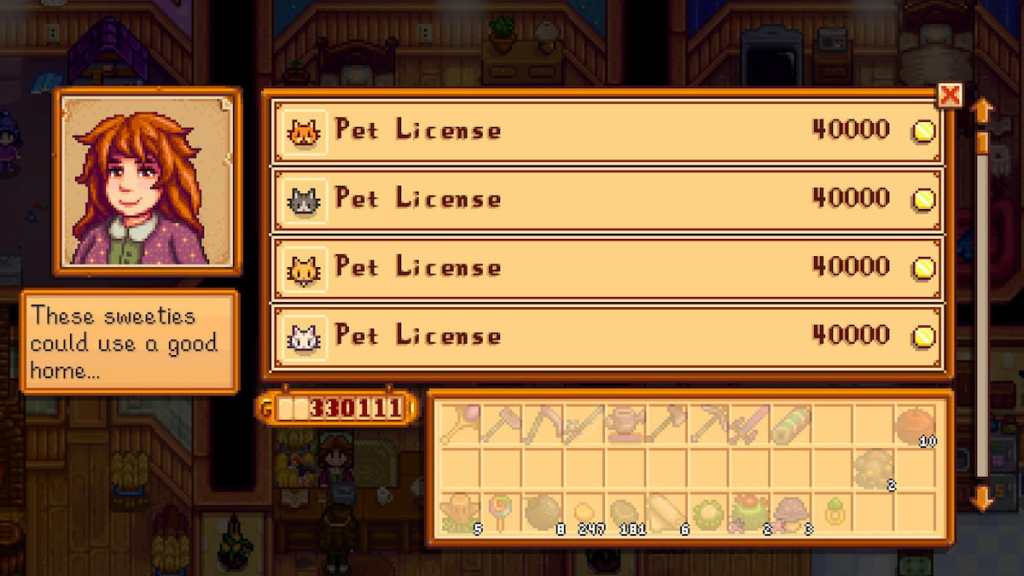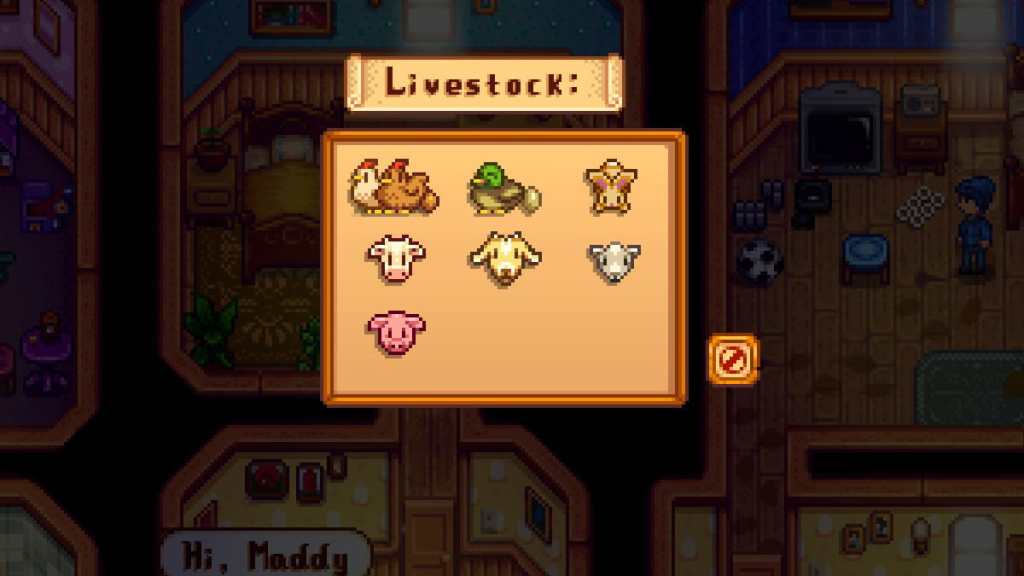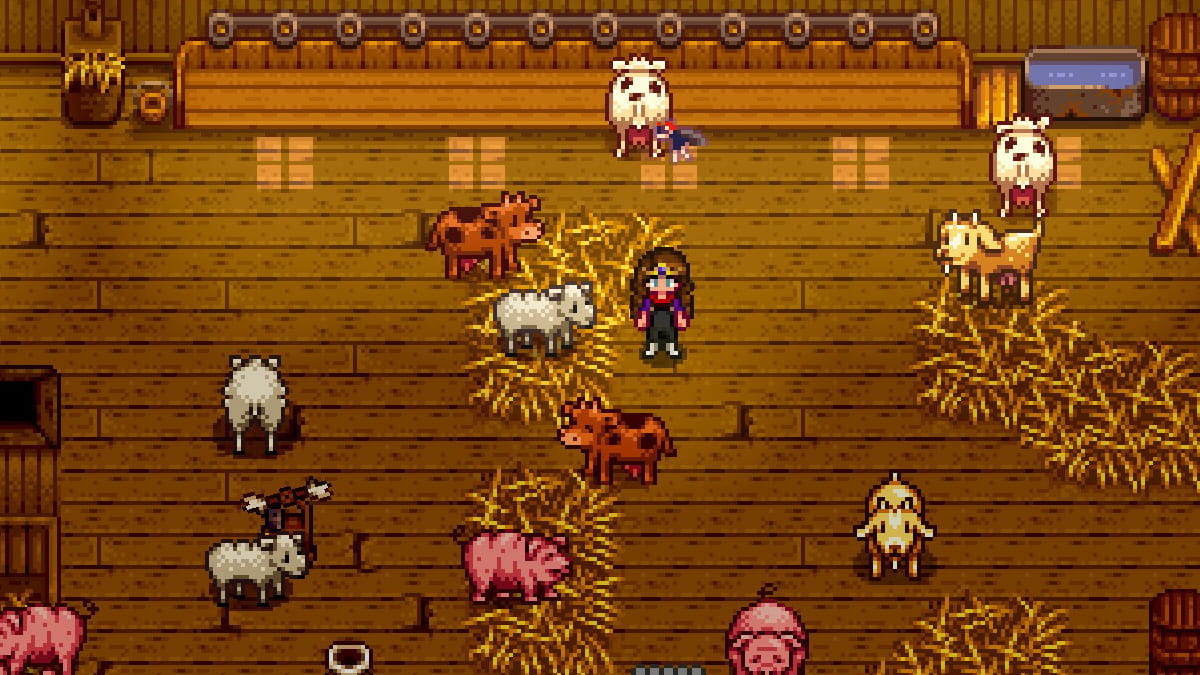I always love hearing about no-brainer tips that are easily overlooked. They’re small advice tidbits, yet they’re impactful over time and make you do a double-take for failing to notice them. For my fellow Stardew Valley fans who enjoy caring for animals, this one goes out to you.
Caring for animals, at least in Stardew, is simple. Despite this, it can be overwhelming for new players who just want to farm fruits and vegetables forever. Fortunately, we have a one-stop shop for all the animal care info you’ll ever need.
Table of contents
Where to buy animals in Stardew Valley
Stardew Valley offers multiple ways for you to unlock pets and farm animals. Below is every animal you can purchase or obtain throughout your playthrough:
- Dog, cat, and turtles
- Horses
- Chicken
- Duck
- Rabbit
- Cows
- Goat
- Sheep
- Pig
- Ostrich
- Dinosaurs
- Slimes
After earning at least 1,000 gold in your playthrough, Marnie will approach your farm, asking if you want to adopt a dog or cat. For the most part, your choice is final unless you buy Butterfly Powder from Krobus. From Year Two onward, you can buy a pet license from Marnie at her ranch, allowing you to unlock turtles or buy more cats and dogs.


Speaking of Marnie’s Ranch, her shop is the key to unlocking other animals. After building a barn or coop on your farm through Robin’s Carpenter, head to Marnie’s Ranch south of the farm to buy some animals. Below is every animal option and their prices:
| Animal | Farm Building | Price |
|---|---|---|
| Chicken | Coop | 800g |
| Cow | Barn | 1,500g |
| Duck | Big Coop | 1,200g |
| Goat | Big Barn | 4,000g |
| Pig | Deluxe Barn | 16,000g |
| Sheep | Deluxe Barn | 8,000g |
| Rabbit | Deluxe Coop | 8,000g |
| Ostrich | Barn | N/A |
| Dinosaurs | Big Coop | N/A |
The exception to this is dinosaurs, ostriches, and golden chickens. Ostriches require you to get Ostrich Eggs from solving Ginger Island’s tenth journal scrap or opening Volcano Dungeon chests, making them one of the rarest animals in Stardew Valley. Dinosaur Eggs are slightly easier to find, as they spawn in artifact spots around the mountain, fishing treasure chests, and from Pepper Rex drops. Lastly, Golden Chickens are a Perfection reward, requiring you to 100 percent Stardew Valley to unlock.
Another exception is slimes. As you explore the mines and defeat slimes, there’s a small chance you’ll pick up their eggs. Although these eggs alone sell for quite a bit, you can also build a Slime Hutch to incubate them, allowing you to have your own slime family. Just watch out; they’ll inflict damage if you walk into them without a Slime Charmer ring on.
How to build Coops and Barns
If you haven’t built a coop or barn yet, Robin’s Carpenter Shop up in the mountains is your first stop. Head up here and interact with her shop to find various building options, with coops and barns being among your choices.
Here’s every farm animal-related building and their material costs:
| Building | Description | Cost |
|---|---|---|
| Coop | Houses four coop-dwelling animals. | 4,000g 300 Wood 100 Stone |
| Barn | Houses four barn-dwelling animals. | 6,000g 350 Wood 150 Stone |
| Big Coop | Houses eight coop-dwelling animals. Comes with an incubator. Unlocks ducks. | 10,000g 400 Wood 150 Stone |
| Big Barn | Houses eight barn-dwelling animals. Allows animals to give girth. Unlocks goats. | 12,000g 450 Wood 200 Stone |
| Deluxe Coop | Houses 12 coop-dwelling animals. Comes with an auto-feed system. Unlocks rabbits. | 20,000g 500 Wood 200 Stone |
| Deluxe Barn | Houses 12 barn-dwelling animals. Comes with an auto-feed system. Unlocks sheep and pigs. | 25,000g 550 Wood 300 Stone |
| Silo | Allows you to cut and store grass for feed. | 100g 100 Stone 10 Clay 5 Copper Bar |
| Pet Bowl | Provides a dedicated home for one pet. | 5,000g 25 Hardwood |
| Stable | Allows you to keep and ride a horse. Horse included. | 10,000g 100 Hardwood 5 Iron Bar |
| Slime Hutch | Raise up to 20 slimes. Fill water troughs and slimes will create slime balls. | 10,000g 500 Stone 10 Refined Quartz Iridium Bar |

Once you build a coop or barn, you can walk in and place items like the auto-collector or heater to make the space more comforting for your animals. You’ll also find a feeding area at the back to place hay. If you have a silo, it’ll automatically dispense hay here as long as you have it full.
How to pet animals in Stardew Valley
Petting your farm animals and pets is one of the best ways to raise your friendship, as it’ll gradually increase your friendship, barring any issues that significantly decrease it. You can pet your animals by right-clicking, tapping, or pressing A on each animal, depending on your platform. When in doubt, press your interact button.
You know how you need to greet/pet your farmyard animals each day to get a little heart and grow your bond so they produce the highest-quality goods? Well, for many of us – especially those of us with more goats, chickens, cows, and pigs than we probably need – the morning ritual can be fussy. Stardew animals can get all bunched up in close quarters, and it’s a little pesky to greet them once so that you don’t accidentally bring up their friendship rating menu when you tend to them.
Although you can go up to each animal and pet them, you can take things a step further by holding the pet/interact button and running up to them – it’ll work perfectly. You’ll get friendship points with every animal, and you won’t have to pull up the dreaded menu.
Here’s a demonstration of the trick on PC from Reddit user Boiled_potato8:
It’ll save you time in the long run, making it relatively easy to raise your friendships as you gain more farm animals.
Alternatively, you can purchase the Auto-Petter from JojaMart for 50,000g or pick it up in Skull Cavern chests. It also can appear in mines during Danger In The Deep and with the Shrine of Challenge active. Having an Auto-Petter in either a coop or barn lets you pet your animals automatically without you ever having to interact with them.
The only downside is that your animals will receive half the friendship points they’d get from you doing it manually. The moral of the story? Human-animal interaction is more important than having a machine do it for you.
How to raise animal friendship in Stardew Valley
Alongside petting your animals, you can also increase their friendship by milking and shearing those that live in your barn. Although keeping them fed with hay will prevent them from losing friendship, letting them outside to eat grass will raise it, with blue grass doubling the effect.
The real challenge comes from preventing your animals from getting upset. Not feeding them and leaving them outside overnight will decrease their friendship significantly, with the latter having a small chance of wild animals coming by and making a mess of things. Not petting or talking to your animals will also lower their friendship.

In short, paying attention to your animals and feeding them will naturally raise their relationship with you over time. Interacting with them twice shows a profile detailing their age, mood, and hearts toward you. The maximum you can earn per animal is five hearts or 1000 friendship points.
Once you reach Farming level five, you can unlock the Rancher or Tiller professions. Choosing Rancher raises the value of animal products, allowing you to make more money later. More importantly, though, you’ll unlock Coopmaster and Shepherd at level ten, letting you befriend animals quickly. If you want to create a massive farm full of animals, picking Rancher and Coopmaster or Shepherd is a solid call.
What does max animal friendship do?
The higher your friendship is with an animal, the higher their odds of producing higher-quality items. Their daily mood also determines this, which can fluctuate depending on how well you cared for them the day before. For example, a happy five-star rabbit has significantly higher odds of producing a rabbit foot than an unhappy zero-star one.
All animal produce types in Stardew Valley
Every animal has their own products you can sell, cook with, or turn into artisan goods. While some are more valuable than others, they’re all useful in their own way. Below is every animal and their product list.
| Animal | Products |
|---|---|
| Chicken | Egg Large Egg |
| Cow | Milk Large Milk |
| Duck | Duck Egg Duck Feather |
| Goat | Goat Milk Goat Large Milk |
| Pig | Truffle |
| Sheep | Wool |
| Rabbit | Wool Rabbit’s Foot |
| Ostrich | Ostrich Egg |
| Dinosaurs | Dinosaur Egg |
Like with most Stardew Valley items, quality and professions matter. Similarly, while Coopmaster and Shepherd help you befriend animals quicker, Artisan in the Tiller branch raises Artisan good value by 40 percent, making it extremely useful if you sell a lot of cheese or wine.
Do animal hearts decay in Stardew Valley?
Yes, they do decay, albeit very slowly. Much like with villagers, you won’t notice much animal heart decay unless you go weeks or entire seasons without feeding or petting them. If you just forget to pet them occasionally or go a day or two without refilling their food, they’ll express annoyance but won’t rapidly drop their hearts. Generally speaking, raising their friendship is much easier than decreasing it.
Can animals die in Stardew Valley?
Although morbid, the answer is yes: your Stardew Valley animals can technically die. Although it’s impossible for them to die from starvation, temperature, or low friendship, leaving them outside overnight can cause wild animals to wreak havoc on your farm. Thankfully, you won’t see the wild animals in action, but you will hear it happen.
What’s the solution, then? Make sure you keep your animals fenced in and repair any broken ones that degrade over time. You’ll also want to either leave them in their barns and coops or only have them out during the day before herding them back inside and repeating the process.
What if you can’t find an animal but haven’t seen the wild animal cutscene? More often than not, your animals will roam around your farm, especially if you have broken (or no) fences. I’ve seen my animals appear in the corners of my map, stranded for days until I finally noticed their disappearance. I’m lucky I didn’t get the cutscene. Your best bet is clearing out any obstacles that can mess up animal pathing or be very proactive in building fences.







